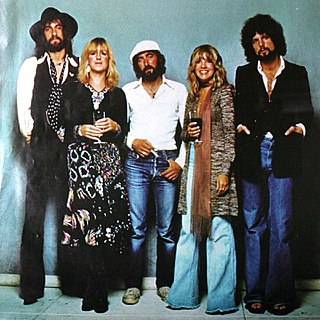
Fleetwood Mac are a British-American rock band formed in London in 1967 by guitarist and singer Peter Green. Green recruited Mick Fleetwood, Jeremy Spencer and Bob Brunning, with John McVie replacing Brunning a few weeks after their first public appearance. Danny Kirwan joined the band in 1968. Christine Perfect, who contributed as a session musician starting with the band's second album, married McVie and joined Fleetwood Mac as an official member in July 1970, two months after Green left the band, becoming known as Christine McVie.

Christine Anne McVie was an English musician and singer. She was the keyboardist and one of the vocalists and songwriters of Fleetwood Mac.

Michael John Kells Fleetwood is a British musician, songwriter and actor. He is the drummer, co-founder, and leader of the rock band Fleetwood Mac. Fleetwood, whose surname was merged with that of the group's bassist John "Mac" McVie to form the name of the band, was inducted into the Rock and Roll Hall of Fame with Fleetwood Mac in 1998.

Tusk is the twelfth studio album by British-American rock band Fleetwood Mac, released as a double album on 12 October 1979 by Warner Bros. Records. It is considered more experimental than their previous albums, partly as a consequence of Lindsey Buckingham's sparser songwriting arrangements and the influence of post-punk. The production costs were initially estimated to be about $1 million but many years later were revealed to be about $1.4 million, making it the most expensive rock album recorded to that date.
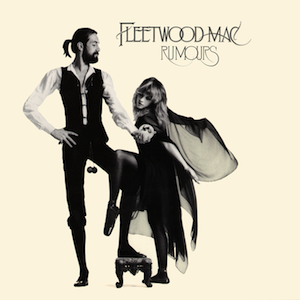
Rumours is the eleventh studio album by the British-American rock band Fleetwood Mac, released on 4 February 1977 by Warner Bros. Records. Largely recorded in California in 1976, it was produced by the band with Ken Caillat and Richard Dashut. The recording sessions took place in the aftermath of several relationship breakups among the band members in addition to heavy drug use, both of which shaped the album's direction and lyrics.

Fleetwood Mac is the tenth studio album by British-American rock band Fleetwood Mac, released on 11 July 1975 by Reprise Records. It was the band's second eponymous album, the first being their 1968 debut album; it is sometimes referred to among fans as the White Album. This was the first Fleetwood Mac album with Lindsey Buckingham as guitarist and Stevie Nicks as vocalist, after Bob Welch departed the band in late 1974. It was also the band's last album to be released on the Reprise label until 1997's The Dance.

Robert Lawrence Welch Jr. was an American musician who was a member of Fleetwood Mac from 1971 to 1974. He had a successful solo career in the late 1970s. His singles included "Hot Love, Cold World", "Ebony Eyes", "Precious Love", "Hypnotized", and his signature song, "Sentimental Lady".

"Over My Head" is a soft rock song recorded by British-American rock band Fleetwood Mac for their self-titled 1975 album. The song was written by keyboardist and vocalist Christine McVie. "Over My Head" was the band's first single to reach the Billboard Hot 100 since "Oh Well", ending a six-year dry spell on the American charts.
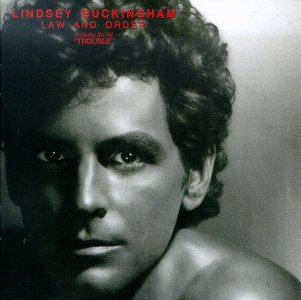
Law and Order is the first solo album by Fleetwood Mac guitarist/vocalist/songwriter Lindsey Buckingham, released in 1981. "Trouble", featuring drumming by Fleetwood Mac bandmate Mick Fleetwood, reached No. 9 on the U.S. charts; the album itself reached No. 32 on the Billboard 200. Lindsey appeared on Saturday Night Live on February 6, 1982 and performed "Trouble" and "Bwana" with Mick Fleetwood's Zoo.
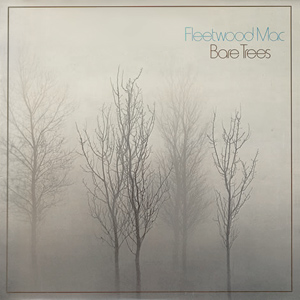
Bare Trees is the sixth studio album by British-American rock band Fleetwood Mac, released in March 1972. It was their last album to feature Danny Kirwan, who was fired during the album's supporting tour. In the wake of the band's success in the mid-1970s, Bare Trees peaked at number 70 on US Billboard Top LPs & Tape chart. The album was certified platinum by the Recording Industry Association of America (RIAA) in 1988.

Future Games is the fifth studio album by British-American rock band Fleetwood Mac, released on 3 September 1971. It was recorded in the summer of 1971 at Advision Studios in London and was the first album to feature Christine McVie as a full member. This album was also the first of five albums to feature American guitarist Bob Welch. "He was totally different background – R&B, sort of jazzy. He brought his personality," Mick Fleetwood said of Welch in a 1995 BBC interview. "He was a member of Fleetwood Mac before we'd even played a note."

Kiln House is the fourth studio album by British blues rock band Fleetwood Mac, released on 18 September 1970 by Reprise Records. This is the first album after the departure of founder Peter Green, and their last album to feature guitarist Jeremy Spencer. Christine McVie was present at the recording sessions and contributed backing vocals, keyboards and cover art, although she was not a full member of the band until shortly after the album's completion.

Penguin is the seventh studio album by British-American rock band Fleetwood Mac, released on March 1, 1973. It was the first Fleetwood Mac album after the departure of Danny Kirwan, the first to feature Bob Weston and the only one to feature Dave Walker.

Mystery to Me is the eighth studio album by British-American rock band Fleetwood Mac, released on 15 October 1973. This was their last album to feature Bob Weston. Most of the songs were penned by guitarist/singer Bob Welch and keyboardist/singer Christine McVie, who were instrumental in steering the band toward the radio-friendly pop rock that would make them successful a few years later.
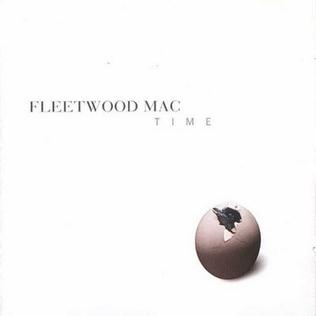
Time is the 16th studio album by British-American rock band Fleetwood Mac, released on 10 October 1995. This album features a unique line-up for the band, featuring the addition of country vocalist Bekka Bramlett and former Traffic guitarist Dave Mason. It was the second album released after the departure of Lindsey Buckingham in 1987, and the only Fleetwood Mac album since 1974's Heroes Are Hard to Find to not feature any contribution from Stevie Nicks. Additionally, it is the final Fleetwood Mac studio album to feature Christine McVie as an official member.

French Kiss is the solo debut by former Fleetwood Mac singer/guitarist Bob Welch. The songs, with the exception of "Sentimental Lady", were intended for a projected third album by Welch's previous band, Paris. However, the group fell apart in 1977 before recording could begin. So instead, Welch used these songs for his debut solo album.

"You Make Loving Fun" is a song by British-American rock band Fleetwood Mac, written and sung by Christine McVie. It was released as the fourth and final 45 rpm single from the band's 1977 album Rumours. "You Make Loving Fun" peaked at No. 9 on the US Billboard Hot 100 and became the album's fourth top-ten hit.

"Sentimental Lady" is a song written by Bob Welch. It was originally recorded for Fleetwood Mac's 1972 album Bare Trees, but was re-recorded by Welch on his debut solo album, French Kiss, in 1977. It is a romantic song, originally written for Welch's first wife. Welch recorded it again in 2003 for his album His Fleetwood Mac Years & Beyond.
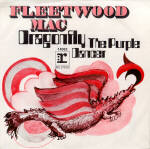
"Dragonfly" is a song written by British rock musician Danny Kirwan with lyrics taken from a poem by Welsh poet W. H. Davies. It was originally recorded by Kirwan's band Fleetwood Mac in 1970, and became the first UK single released by the band after the departure of their frontman Peter Green. It was also their first single with Christine McVie as a full member of the group. By the time the song had been released, guitarist Jeremy Spencer had left the band.


















